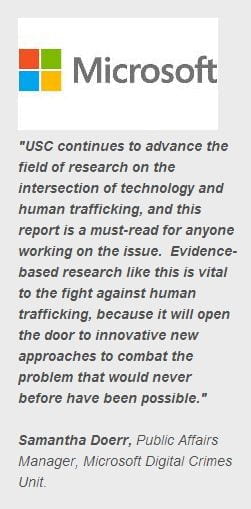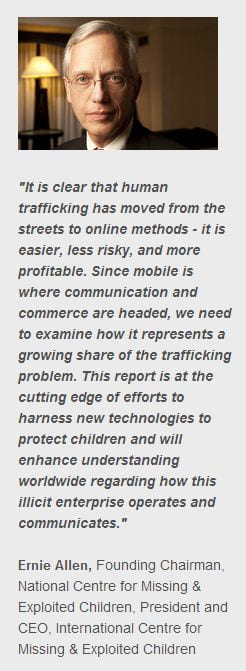FOR IMMEDIATE RELEASE
Click to download the press release (PDF).
USC Annenberg report reveals mobile as new battleground in fight against sex trafficking
LOS ANGELES, November 13, 2012 — Mobile phones and devices are now being used to traffic minors for commercial sex in the United States. They are among numerous digital channels – including popular social networking sites and online classifieds – facilitating the exploitation of children, according to a newly published report from the Center on Communication Leadership & Policy (CCLP) at the University of Southern California’s Annenberg School for Communication & Journalism.
The Rise of Mobile and the Diffusion of Technology-Facilitated Trafficking is the latest CCLP research report on the intersection of technology and human trafficking, and the follow-up to CCLP’s pioneering 2011 report, Human Trafficking Online. Drawing from a series of first-hand interviews with law enforcement officials and an analysis of mobile phone data, the report urges policymakers, business leaders, law enforcement, and social service providers to develop innovative solutions to technology-facilitated trafficking.
“Increasingly, the business of human trafficking is taking place online and over mobile phones,” explains CCLP Research Director Mark Latonero, Ph.D. “Mobile devices allow traffickers to expand their criminal networks in new ways. At the same time, these technologies can be used to target traffickers, reach vulnerable communities, and raise public awareness.”
“Technology contributes to both the problems and solutions regarding human trafficking,” says Alec Ross, Senior Advisor for Innovation in the Office of Secretary of State Hilary Clinton.
“This report is an important contribution to the field and should be widely read by those seeking to develop solutions to the evil of human trafficking.”
“It is clear that human trafficking has moved from the streets to online – it is easier, less risky and more profitable,” says Ernie Allen, President and CEO of the International Centre for Missing & Exploited Children. “This report is at the cutting edge of efforts to harness new technologies to protect children and will enhance understanding worldwide.”
The report highlights the opportunity for private-sector technology companies and mobile carriers to work with the anti-trafficking community to develop meaningful solutions.
“Evidence-based research like this is vital in the fight against human trafficking, because it will open the door to innovative new approaches to combat the problem that would never before have been possible,” says Samantha Doerr, Public Affairs Manager for Microsoft’s Digital Crimes Unit.
Courtney Bowman, Civil Liberties Engineer at Palantir Technologies, adds “this report…reminds us that technology is not developed in a vacuum [and] technologists too have a role to play in considering the social, cultural, legal, and constitutional implications of their craft.”
The report’s recommendations include: 1) developing a comprehensive strategy to address human trafficking occurring on multiple digital platforms including mobile; 2) training law enforcement and social service providers; and 3) encouraging public officials to place human trafficking high on their policy-making agendas.
“This report reflects our center’s commitment to the use of technology to improve society, and breaks new ground in the area of human trafficking,” says CCLP Founder and Director Geoffrey Cowan. “We look forward to continuing to work with a wide range of colleagues to find new ways for technology, and particularly mobile technology, to help rather than to harm, society.”
The Rise of Mobile and the Diffusion of Technology-Facilitated Trafficking can be found online at technologyandtrafficking.usc.edu. For more information about the USC Annenberg Center on Communication Leadership & Policy, visit communicationleadership.usc.edu.
About the Technology & Trafficking Initiative
CCLP’s Technology & Trafficking Initiative began in 2010 with a meeting convened in Washington, D.C. by CCLP director Geoffrey Cowan with Alec Ross, Secretary of State Hillary Clinton’s Senior Advisor for Innovation, and Ambassador Luis CdeBaca, head of the State Department’s Office to Monitor and Combat Trafficking in Persons.
In 2011, CCLP released Human Trafficking Online, the landmark report examining the landscape of human trafficking online, particularly classified ad sites and social networking sites. Evidence gathered for the report demonstrated that the Internet was being used to facilitate human trafficking, particularly the sex trafficking of minors. The report also explored the potential of digital tools such as data mining, search analytics, and computational linguistics to combat human trafficking.
About the Center on Communication Leadership & Policy
Based at the USC Annenberg School for Communication & Journalism, the Center on Communication Leadership & Policy is a policy center that conducts research, organizes courses and fosters dialogue through programs, seminars and symposia for scholars, students, policymakers and working professionals on issues including communication technology, mobile innovation, and social change.
For more information, visit communicationleadership.usc.

Contact: Geoffrey Baum
Phone: (213) 740-9683


